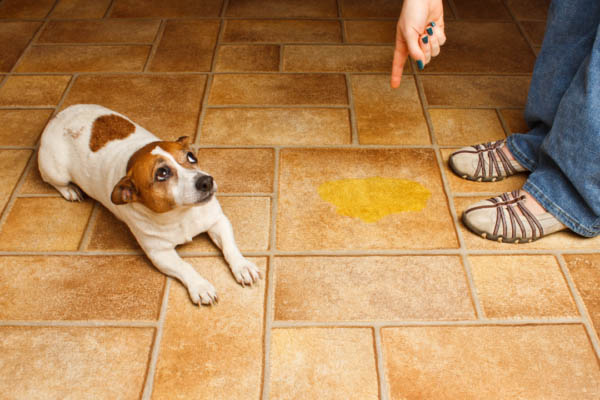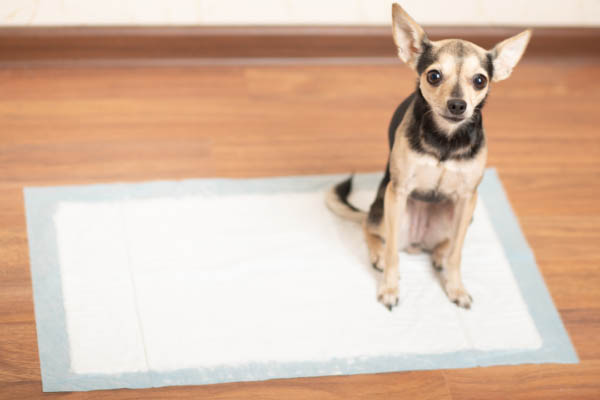
Do Belly Bands Stop Dogs from Marking? The Truth about Belly Bands
This post may include affiliate links. Please read my disclosure policy.
Dog belly bands have been promoted as an easy way to deal with dog pee problems in the house.
However, depending on the cause of your pup’s pee problems, belly bands can make the original problem worse or even cause new problems!
It’s important to understand what can cause your dog’s pee problems to determine if your dog really needs a belly band. And if you discover they do need to wear a belly band, it’s crucial to know how to use it correctly and safely.
What Is a Belly Band for Dogs?
Dog belly bands are made out of fabric or diaper material. They are used on male dogs to catch urine.
As their name implies, they wrap around male dogs’ bellies so that when they pee, the band collects the urine, much like a diaper does. Because a female dog has different anatomy, belly bands don’t work on them, and they’ll need a dog diaper instead.
Some pet parents use dog belly bands when their dog has problems with house training, territorial marking, or urinary incontinence.
But do belly bands stop dogs from marking?
Why Do Some Pet Parents Like Dog Belly Bands?
If a dog has a problem with house training, dog belly bands may seem like an easy and convenient way to stop accidents.
Other male dogs have issues with urine marking or have developed territorial marking behavior in the house. If that happens, pup parents may see dog belly bands as a quick and effective solution.

However, if they are not used properly—or if they’re used for the wrong reasons—they can cause more harm than good.
Common Uses of a Dog Belly Band
Many veterinarians have mentioned that these bands do not train dogs to stop marking or peeing inside the house; it only stops their pee from reaching an intended spot. Still, some pet parents use dog belly bands for the following situations or reasons:
- Senior pups with incontinence: Age can bring about a few changes, and one of them might be incontinence. Some pup parents use belly bands to remedy this, though under strict instructions and recommendations from veterinarians.
- Submissive tendencies: Dogs who urinate submissively often do so out of fear. They often display symptoms like a cowered posture or rolling over. Some pet parents use the band to limit messes. Some dogs can outgrow this behavior, but others, like older dogs, may need training to modify or resolve this behavior.
- Bursts of excitement: We all know those dogs who just can’t contain their joy! Some doggy parents use belly bands on their pups who tend to dribble when visitors drop by.
- Guest markers: When pup parents visit other homes for playdates, they sometimes use a belly band on their dog to prevent marking in the house.
Are Dog Belly Bands a Good Way to Stop Accidents in the House?
This depends on what is causing your dog’s accidents.
They could be caused by:
- House training issues
- Urine marking
- Urinary incontinence
- Medical issues
House Training and Urine Marking
If house training issues or urine marking in the house is the culprit, especially with male dogs, belly bands are not your best option.
Why Belly Bands Aren’t the Solution
Don’t get me wrong; they definitely will keep your dog from going potty on the floor, but they won’t help the underlying problem. In fact, they are likely to make it worse.
That’s because house training and urine marking problems are usually behavioral problems. If the behavioral issue isn’t addressed, your dog will continue to have problems. And then you’ll be stuck using belly bands forever!

You want your dog to know that urine marking and peeing inside the house are unacceptable.
When you put a belly band on them, you’re telling them “now it’s okay to pee or mark inside the house.” This can be very confusing to your dog, and they never learn where you want them to go.
How to Deal with House Training and Urine Marking Problems
If a previously house-trained dog starts regularly having accidents, the first thing you want to do is speak to your veterinarian. There may be a medical reason for the problem. Once medical reasons have been eliminated, it’s time to move on to behavioral issues that may be causing the problem.
Dealing with pee problems can be incredibly frustrating. Believe me, I’ve been there.
When we were housebreaking Tulip (which took about nine months), I couldn’t believe how hard it was to train her. We tried everything—puppy pads, taking her out every 30 minutes, you name it.
I couldn’t imagine having a dog that wasn’t housebroken, but I still decided not to use belly bands or doggie diapers even though it might have been more convenient for me. I wanted to figure out what was best for Tulip.

I also wanted to help other pet parents who had similar pee problems with their dogs. That’s why I wrote the book about it!
I also wrote multiple posts to help pet parents who are dealing with these issues, from house training a new puppy to stopping your dog from peeing in the house to ending your dog’s urine marking.
I even made my own enzyme cleaner to help pup parents dealing with the aftermath of their dogs’ accidents.
While it definitely takes more time and energy in the short term, dealing with the root of your dog’s pee problems will save you far more time, energy, and frustration in the long term.
Urinary Incontinence
As I mentioned above, if your dog was previously house-trained and starts having accidents, the first thing you want to do is talk to your veterinarian. Urinary incontinence can be caused by many different medical issues and even emotional issues like anxiety. Your veterinarian can help determine if a medical reason is to blame and what treatment your pet might need.

Below are some common medical causes of dog incontinence:
- Urinary tract or bladder infection
- Weak bladder sphincter (common in senior or spayed female dogs)
- Consuming too much water
- Spinal cord issues
- Hormonal problems
- Urinary stones
- Prostate disorder
- Diabetes
- Kidney disease
- Cushing’s disease
- Congenital abnormalities
- Certain medications
- Anxiety
Since some causes of urinary incontinence can’t be cured, your veterinarian might recommend belly bands for dogs or diapers for your pup.
Pin me!

What Are the Cons of Dog Belly Bands for Dogs? Can They Be Used Safely?
As mentioned above, dog belly bands are not a good solution for house training or marking problems. They may help the symptoms, but they don’t fix the underlying problem.
If you are using dog belly bands to help with a medical condition like incontinence, there are still potential problems you’ll need to know about. This will help you use them correctly and protect your dog’s health.
1. Urine Burn or Scald
You will need to change the belly band as soon as it is soiled to prevent urine burn. This painful condition happens when the soiled band stays on your dog’s skin for too long. Even if you don’t think your dog has soiled the band, you should change it every three hours or so. It may also be a good idea to coat the skin under the belly band with a skin protectant, such as silver sulfadiazine cream or petroleum jelly.
2. UTIs
Bacteria can grow in a soiled belly band or diaper. This can lead to a urinary tract infection. Changing them frequently and keeping your dog clean will help.
3. More Frequent Bathing
Since urine will be in contact with your dog’s fur, they will need more frequent bathing to prevent urine burn or unpleasant urine odors. This also helps prevent bacterial growth, which can cause infections. Frequent whole-body baths can cause dry or irritated skin. A gentle spot bath with a dog-safe, soothing shampoo, baby shampoo, or doggy dry-shampoo may be great options.
4. Skin Irritation
The band itself may cause skin irritation if put on too tightly or if your dog wears it for too long at a time
5. Cleaning Belly Bands
Depending on the material your dog’s belly band is made of, it can be difficult to clean. You’ll want to wash it separately from your other clothing or household items.
How to Correctly Use Belly Bands
If your veterinarian has given you instructions or has okayed the use of belly bands on your dogs with incontinence, please ensure the following for the comfort of your puppy and your peace of mind:
- Measure your dog’s waist. Before purchasing, measure your pup’s waist to ensure you choose the correct size.
- Select the right fit. The band should be snug but not overly tight to avoid discomfort. Any band you’ve chosen should be approved by your veterinarian.
- Insert an absorbent pad. Place an absorbent pad inside the band; this boosts comfort and simplifies clean-up.
- Check and change regularly. For hygiene and comfort, frequently check and change the pad to keep your dog dry.
- Provide regular breaks. Remove the band periodically to let your dog’s skin breathe and prevent potential skin issues.
- Outdoor potty breaks. Even with a band on, ensure your dog has plenty of opportunities to go outside to potty.
The tips mentioned above should only be used for dogs with medical issues. Again, belly bands are not a permanent solution for training issues or problems.
The Tail End
If recommended by your veterinarian and used correctly, dog belly bands can be a useful tool for dogs struggling with certain medical issues. However, for dogs with house training or urine marking problems, they are not a good solution and could even worsen the problem.
Would you like to learn more about how to stop your dog peeing inside the house for good? Then click below to download your FREE copy of my ebook!








Kristen, you have made the excellent constructive points in the article. Do you think the pup’s pee problems can be related to emotional issues due to rehoming? If it is true, then the belly band can exacerbate the situation. What do you think?
Hello Jack,
Pee problems can definitely be related to anxiety, and anxiety can definitely be caused by rehoming.
Finding the root cause of your pup’s pee problems is the best way to help.
You can find more info on causes and solutions to common pee problems in my free Ebook.
Kristen
Thank You, Kristen. I really appreciate your effort.
Interested in E book. Have one male dog I believe is “marking”. He seems healthy in every other way. Another male in the house who shows dominance. Help.
Hi Elizabeth!
Even though marking and dominance issues are very common, they can be so frustrating! Here’s the link to the free ebook you mentioned – it has a ton of tips, techniques, and solutions for all the common pee problems.
Hope this helps!
Kristen